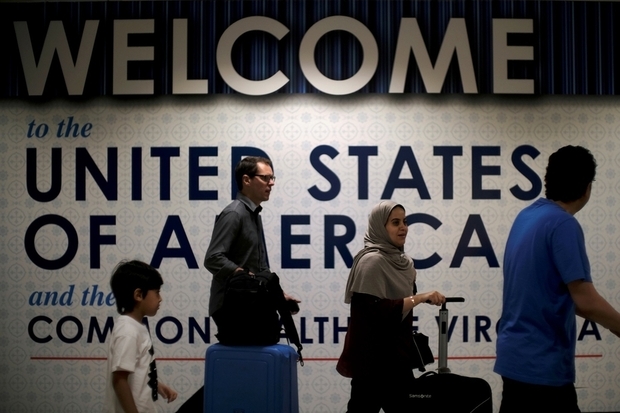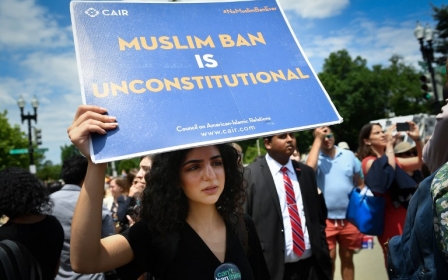'Fundamentally un-American': Sharp decline in US refugee admissions

The US has taken in the lowest number of refugees since the adoption of the 1980 US Refugee Act – the programme that made the country the largest host for resettled refugees worldwide.
According to a Pew Research Center study based on new data by the UN refugee organisation, the US took in approximately 33,000 refugees in 2017, while the rest of the world opened its doors to 69,000.
The 2017 figure represented the lowest number since the 9/11 attacks on the US when refugee admissions were temporarily suspended. It also marks a steep drop from the 97,000 refugees resettled in 2016.
This revelation comes despite the US having historically led the world in taking in refugees; three out of more than four million refugees resettled worldwide have been taken in by the US since 1980.
It’s going to take a serious effort from all people of conscience in our country to push back on this regressive trend
- Omar Baddar, AAI
“US refugee resettlement is on pace to remain at historically low levels in 2018,” said Phillip Connor and Jens Manuel Krogstad who co-authored Pew's analysis of UNHCR's data. However, no single country has surpassed the US in the number of refugees it admitted.
“The US has admitted more than 16,000 refugees with about three months remaining in the current fiscal year, according to US State Department data,” Connor and Krogstad explained. “The number of Muslim refugees admitted to the US has dropped more than other religious groups.”
Muslim refugees
While it is part of an overall drop in admissions of refugees from all religious backgrounds, State Department numbers showed that only about 1,800 Muslim refugees resettled in the US in the first half of fiscal 2018. They accounted for 17 percent of the refugees admitted during that time compared to 63 percent of Christians.
Fewer than 50 Syrians, for example, have been admitted to the US as of 31 May of fiscal year 2018, according to the State Department, despite the US being the largest donor to Syria, providing approximately $8bn in humanitarian assistance to the war-ravaged country.
Proposals to ban all refugees from certain Muslim-majority countries have been challenged repeatedly by lower courts until the Supreme Court weighed in recently and allowed travel restrictions that have collectively become known as the “Muslim ban” to go forward.
Critics believe that the ban – which also includes North Korea and Venezuela – is designed to discriminate against immigrants from certain countries based on religion.
“That the decline in refugee admission disproportionately affects Muslim refugees is no coincidence, as Trump has repeatedly demonstrated his anti-Muslim animus, from campaign rhetoric to travel ban policy,” said Omar Baddar, deputy director of the Washington-based Arab American Institute.
'Fundamentally un-American'
“Despite the body of proof of the benefits refugees bring to the American economy and society-at-large, the administration is implementing policies that both deny a safe-haven and a better life to the world’s most vulnerable and negatively impact American prosperity moving forward,” said David Miliband, president and CEO of the International Rescue Committee.
The lower numbers have come to reflect changes carried out by the Trump administration in recent months that have directly impacted refugees. The administration lowered the refugee ceiling for fiscal 2018 to 45,000 refugees – the lowest since the modern resettlement plan was adopted in 1980.
The White House also ordered additional vetting procedures in October and January, calling them a necessary step to ensure applicants are not a threat to national security.
“The way the Trump administration has turned America’s back on refugees is fundamentally un-American,” Baddar said. “We are a country built by and for those who seek freedom from persecution and violence around the globe, and the words engraved on the Statue of Liberty affirm America’s place in the world as a refuge.”
A recent survey showed that Americans are divided over whether their country has a responsibility to accept refugees. The poll taken in April and May showed that while about half of Americans – notably Republicans – believed the US had a responsibility to admit refugees, 43 percent said it did not.
“After the tremendous progress we made as a diverse and inclusive society over the decades, it is a shame to see our country’s top leadership undermine this progress in real and damaging ways,” Baddar said. “It’s going to take a serious effort from all people of conscience in our country to push back on this regressive trend.”
New MEE newsletter: Jerusalem Dispatch
Sign up to get the latest insights and analysis on Israel-Palestine, alongside Turkey Unpacked and other MEE newsletters
Middle East Eye delivers independent and unrivalled coverage and analysis of the Middle East, North Africa and beyond. To learn more about republishing this content and the associated fees, please fill out this form. More about MEE can be found here.




